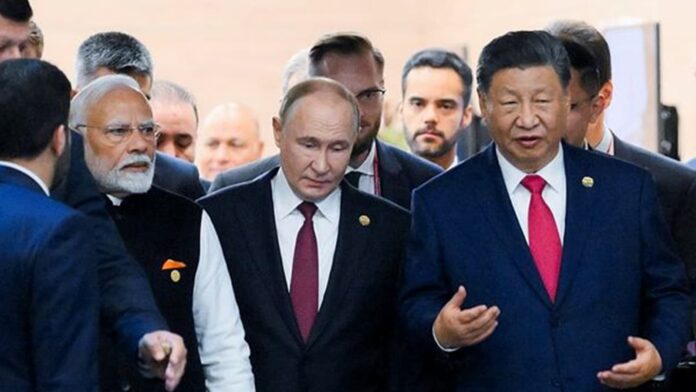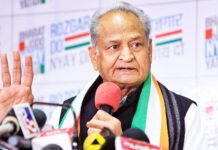The reality is, both the U.S. and China will pursue their interests with or without India. And therefore, our foreign policy must be self-driven.
In the chessboard of global geopolitics, India stands as the knight—sometimes unpredictable, often misunderstood, but vital to the balance of power. We are not a pawn in someone else’s game, and it is time we stop behaving like one. As the world polarizes around two superpowers—the United States and China—India must play the role of the equidistant force, not favouring either but asserting its own strategic autonomy. At the same time, we must deepen ties with our real friends—Israel and Russia—nations that have stood by us not merely in words but in war, crisis, and technological transformation.
Let’s be clear—India does not owe allegiance to either Washington or Beijing. The United States is a powerful democracy, and India’s bilateral trade with the U.S. crossed $128.8 billion in FY2023, making it our largest trading partner. From defence to technology, cooperation has grown. The U.S. has backed India’s stance on terrorism, especially in forums like the UN Security Council, and has been an advocate for India’s permanent seat there.
But let’s not forget history—or reality. The U.S. is transactional. Its foreign policy is governed not by loyalty but by leverage. Washington sells dreams of liberty but has a track record of regime changes, double standards, and opportunistic alliances. From arming Pakistan for decades to turning a blind eye to India’s core concerns at the WTO, the U.S. plays to its own interests first.
Now look east. China, the dragon, is not just a competitor; it is an adversary. The Galwan Valley clashes of June 2020, where 20 Indian soldiers were martyred, reminded us of Beijing’s real face. It is not just about disputed borders; it’s about the ethos of expansionism. China wants to dominate Asia, and India stands in its way. The $117.6 billion bilateral trade in 2023, with a record $85 billion trade deficit, only tells one side of the story. Economically, we are feeding the same beast that threatens our sovereignty.
Non-alignment in the Cold War era was about staying away from ideological camps. Strategic autonomy today must be about power projection without foreign dependence. That doesn’t mean sitting on the fence. It means sitting on our throne—knowing we don’t need validation from Washington or fear from Beijing.
The reality is, both the U.S. and China will pursue their interests with or without India. And therefore, our foreign policy must be self-driven. We must navigate with the wisdom of Chanakya—not get seduced by American praise or Chinese money. Keep both at arm’s length, build transactional relationships with both, but invest emotionally and strategically in friendships that are time-tested.
When the world turned its back on India after the 1999 Kargil War, it was Israel that sent us critical ammunition and surveillance drones. Quietly. No press releases. No conditions. Just support. Today, that same Israel is a technology powerhouse, a leader in cybersecurity, water management, defense innovation, and agri-tech. And it is a democracy, like us—surrounded by hostile neighbours, like us.
India-Israel trade reached $10.1 billion in 2023, and yet the relationship is under-leveraged. The Abraham Accords have further opened the possibility of triangular cooperation between India, Israel, and the Gulf states. Prime Minister Narendra Modi’s historic 2017 visit to Israel marked a turning point, but we need to go further—create joint innovation funds, co-develop military tech, and build educational pipelines between Indian and Israeli institutions.
It is also about values. Israel and India face the same ideological enemy: radicalism. The October 7, 2023 Hamas attack on Israeli civilians was not just an attack on Jews—it was an attack on civilization. India’s solidarity with Israel must not be diluted by appeasement politics at home. We know what Islamist terrorism looks like. Israel lives that truth daily. That shared struggle must become the foundation for strategic trust.
Let’s address the elephant in the room: Russia’s war in Ukraine. Western analysts expect India to condemn Russia. But strategic diplomacy is not about pleasing the West—it’s about protecting national interest. Russia has been our all-weather partner. Over 60% of India’s military equipment is of Russian origin. Russia has helped us with nuclear energy (Kudankulam), cryogenic technology, and BrahMos missiles. India’s energy imports from Russia have also surged post-2022. In FY2023-24, Russia became India’s largest oil supplier, with imports hitting over 1.7 million barrels per day, according to the Ministry of Commerce. This isn’t charity—it’s economic prudence. Cheaper oil helps tame inflation, stabilize our economy, and reduce dependence on Middle Eastern supply chains.
Critics in the West may scoff at India’s non-condemnation of the Ukraine conflict. But they forget: the same West kept arming Pakistan while preaching democracy to India. We owe no moral explanation to anyone. As External Affairs Minister Dr S. Jaishankar rightly put it: “Europe’s problems are not the world’s problems.”
Russia is also pivoting eastward. The Russia-India-China (RIC) dialogue and BRICS are platforms India must shape, not shun. India must use its influence to moderate Russian aggression, not isolate it. Because an isolated Russia will fall deeper into China’s lap—and that is against our national interest.
REDEFINING QUAD AND BRICS IN INDIA’S IMAGE
While the Quad (India, U.S., Japan, Australia) is important for Indo-Pacific stability, it must not become a NATO-like structure. India should extract technological, maritime, and diplomatic benefits—but never allow its sovereignty to be compromised.
Similarly, in BRICS, India must counter China’s dominance and push for democratic reforms, expansion of trade in rupees, and a counter-narrative to the petrodollar hegemony. These multilateral forums are not ends—they are levers. India must be the fulcrum, not the follower.
India’s civilizational ethos is not to be a vassal state. We are the land of Vivekananda, Gandhi, and Patel—men who balanced spirituality with statecraft, strength with sagacity. We do not need American affirmation or Chinese intimidation. What we need is clarity. Our allies are those who walk with us in storms, not those who hand us umbrellas after the rain.
In the 21st century, India’s rise is inevitable. But who rises with us is a choice we must make with care. The U.S. and China are poles of power—but Israel and Russia are pillars of partnership. Keep your friends close, your rivals at bay, and your destiny firmly in your hands.
That, dear reader, is the India we must believe in. And build.
* Savio Rodrigues is the Founder & Editor-in-Chief of GoaChronicle, a strategic affairs commentator, and the author of multiple books on politics, national security, and spirituality.








